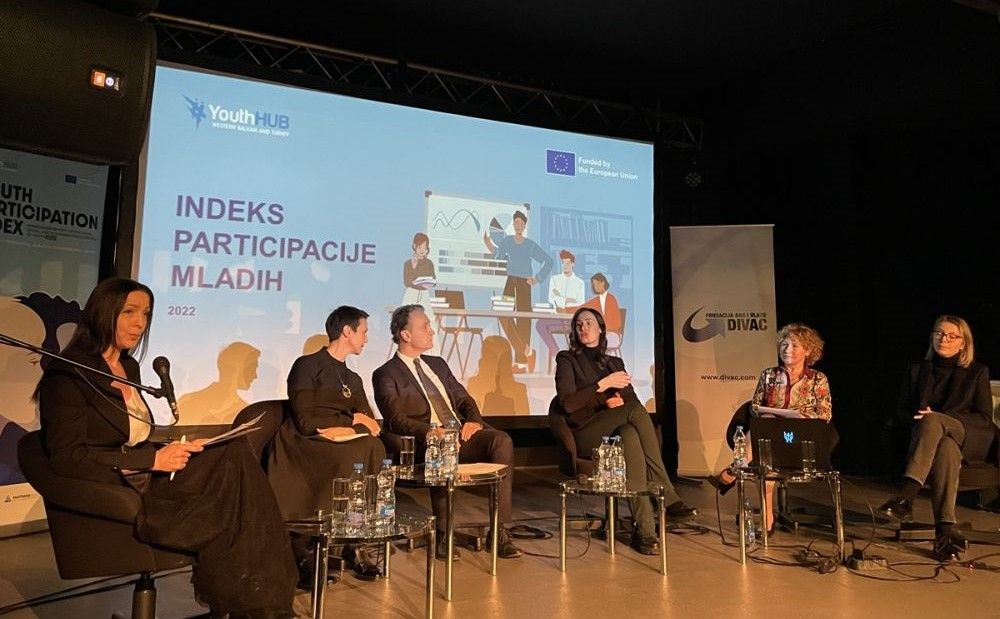According to the latest data, 17.1 per cent of young people in Serbia, ages 15-29, are currently unemployed, and of the total number of people in prisons in Serbia 35.8 per cent are young people (up to 29 years old), which is an increase of 12 per cent compared to the previous year, it was said today at the presentation of the annual edition of the regional Youth Participation Index at the Belgrade Youth Center, organized by the Ana and Vlade Divac Foundation.
At the presentation of this seventh annual edition of the Youth Participation Index, the insufficient representation of young people in political life, the exclusion from employment and education was pointed out, as well as, risks such as long-term unemployment and poverty, especially for young women and those living in the countryside.
“This is the seventh year in a row that we have done this Youth Participation Index in the region, which gives us the opportunity to monitor positive or negative trends, and this significantly contributes to planning further steps in terms of improving the position of young people,” said Ana Koeshall, Director of the Ana and Vlade Divac Foundation, at the opening of the conference.
The index is measured within the project “WB&T for EmploYouth” with a focus on supporting the employment of young people in NEET status - those who are not employed, nor are in education of training. This project covers Serbia, Albania, Montenegro, North Macedonia and Turkey, including a network of organizations from the mentioned countries, and is supported by the European Commission, as part of its efforts to constantly improve the attitude of decision-makers towards young people.
“The European Union is happy to support youth participation in Serbia and the region through the Youth Participation Index. It complements other employment initiatives funded by the EU, such as the pilot “Youth Guarantee”. The Youth Guarantee will provide individual counselling to young people, training opportunities and jobs, with specific measures for female beneficiaries such as child care and transportation to work in pilot municipalities,” said Matthieu Penot, Programme Manager, Delegation of the EU to Serbia.
For the past seven years, the Youth Participation Index (YPI) has been published as a mechanism for gaining insight into the broad political, economic and social context that can empower or hinder youth participation in society. Covering a series of data collected from 2016 to 2022, the YPI provides a comprehensive overview of youth opportunities through the prism of 25 indicators of political, economic, and social participation.
“The Ministry of Tourism and Youth sees the Participation Index as an important tool at our disposal with the aim of easier and more accurate assessment and monitoring of the position of young people in the wider social context and identifying ways to encourage the active participation of young women and men at all levels an in all social processes that contribute to the overall well-being”, said Ivana Antonijević, Assistant Minister of Tourism and Youth.
The Youth Participation Index, apart from being a key tool for decision-makers and civil society organizations, provides the possibility of comparing results among the mentioned countries of the region. This process also enables the monitoring of progress and good practices or warning of negative phenomena that affect young people in Serbia, but also in the wider region.
“Young people who are unemployed and are not even in the education system, when they find employment they often remain a vulnerable category, because often these jobs are insecure, underpaid and without all the benefits such as paid leave from work, health and social insurance, etc.,” said Mirjana Mirosavljević Bobić, Project Manager from the Ana and Vlade Divac Foundation.
In addition to a series of specific data on political, economic and social participation, the Index also provides a series of recommendations for imrpvoing the position of young people in the region. For example, the Index recommends the data on young people should be easily available on the websites of public statistical institutes, that governments, parliaments, political parties and youth organizations in the region should deal strategically with improving young people’s access to political positions, and that public institutions should implement measures such as improving active labor market policies and training and retraining programmes. Entrepreneurship among young people, especially young women, should also be encouraged by providing appropriate and continuous administrative, legal, technical and mentoring assistance, as well as financial support.
The entire research is available HERE.
